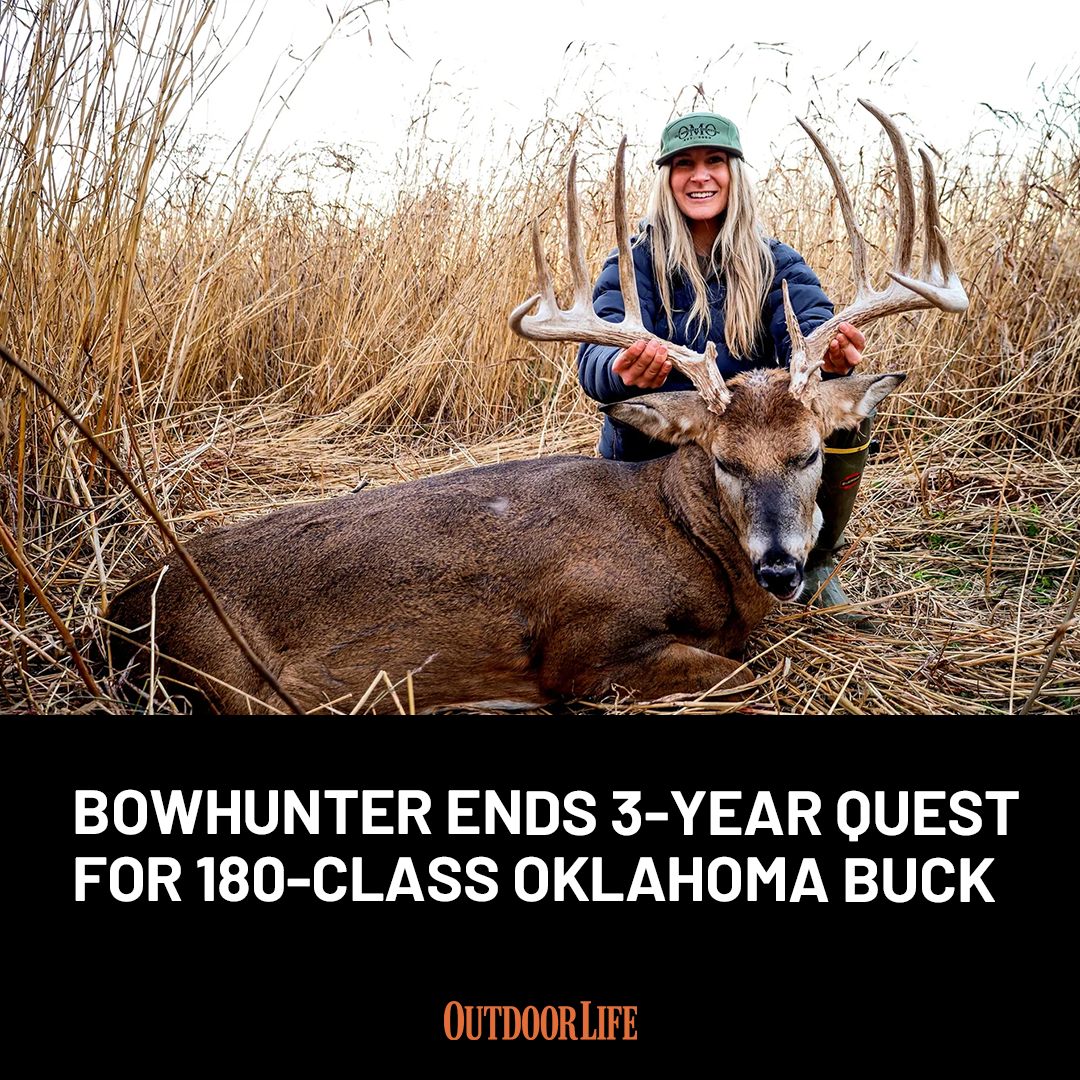It’s taken three years for Kelsie Jo Harris to notch her tag on the giant 11-point buck she nicknamed “George Long Tines.” After seeing the buck countless times and getting dozens of trail cam photos, the Oklahoma bowhunter blew her chance last season, when she missed the buck cleanly from 15 yards. This year would be a different story, however, and at 8 a.m. on Nov. 1, Harris ended her quest for the legendary buck.
“Although I’m so very grateful I got him, I’m going to miss chasing George Long Tines,” Kelsie tells Outdoor Life. “GLT taught me so much about hunting over the last few years and truly made me a better hunter.”
Harris’ long history with the buck centered around the same 80-acre lease she hunts in Grant County. Over the years, she learned from trail camera photos that the buck usually passed near her treestand in the evenings, usually well after dark.

“But two mornings before I shot him, he showed up at 6:40 a.m.,” Harris says. “So I knew this was my chance to get him during daylight.”
Climbing into her lock-on stand that Wednesday morning, she looked over a small 5-acre patch of timber surrounded by soybean and corn fields. It wouldn’t be long until GLT made his final appearance.
Harris got in position to draw, but she says her arm kept locking up.
“Buck fever had set in. I wasn’t sure if I was even going to be able to draw back.”
Slowly, Harris was able to come to a full draw. But as she pulled, she bumped her bow against the quiver that hung in the stand tree.

“It made a slight click sound, which really was good because it made the buck stop broadside at 30 yards,” she says. “That’s when I settled my sight behind his shoulder and released.”
Harris nearly missed the buck a second time. Her arrow nicked a twig mid-flight, and it ended up hitting GLT in the ham.
“I went into full panic. I thought I ruined the one opportunity I had to get him. My heart was shattered as I watched him trot into a field. But then I saw a lot of blood coming out of the arrow wound.”
She watched the buck through her binoculars as it laid down roughly 125 yards from her stand. For the next 90 minutes or so, Harris watched as the buck would stand up, take a few steps, and then lay back down. She stayed in the tree until around 10 a.m., when she called her husband, Brett.
The two circled where she’d last seen the buck, and then got permission from the neighboring landowner to look for GLT on his property. After searching through the thick cover, they contacted tracker Jerry Logsdon.
“He has an incredible tracking dog named Marley, who we’ve used before,” Harris explains. “They showed up about 4 p.m. and he put Marley on GLT’s trail. He was off like a bullet after the buck.”

But Marley didn’t have an easy trail to follow. The buck had circled a few times in the nearly impenetrable head-high grass. They found several places where GLT bedded, but then he’d get up and slip deeper into the tangled cover.
Finally, after a two-hour tracking job, Marley located the downed buck bedded in a thick jungle of grass. Harris says the buck only traveled 200 yards from the spot the deer was hit to the place it was found. But the tall grass made finding GLT nearly impossible, and Harris doubts they would have recovered the deer without Marley’s nose.
Read Next: New Blood Tracking App Could Change Everything We Know About Recovering Wounded Deer
GLT is a mainframe 5×6 with a sticker point and a green score of 184 inches, which should easily qualify for the Pope & Young record book. Harris and her husband think the deer was around 7.5 years old, and the buck may have been just past its prime. Trail cam photos show that it was a 12-point last season, and a pair of its sheds found this spring would score closer to 190 inches. Regardless, it’s a bittersweet end to a years-long quest that became an obsession for Harris.
“I felt like it was just him and me in those woods. Almost like an old friend to see, and now it’s just too good to be true.”
